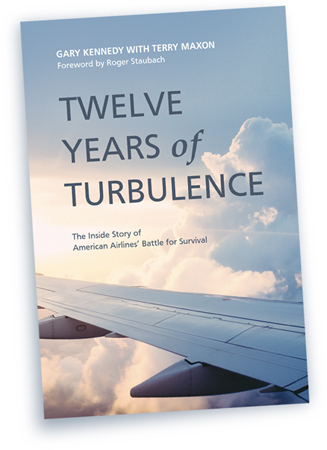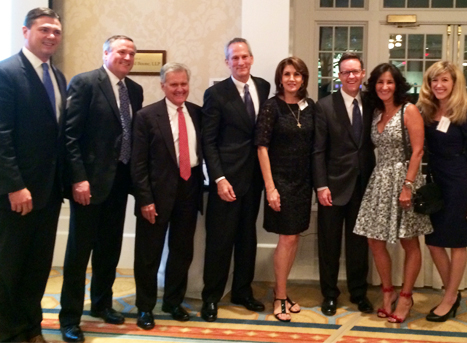© 2018 The Texas Lawbook.
By Mark Curriden
(Feb. 5) – Months after American Airlines filed for bankruptcy in 2011, I wanted to do an article about the company’s general counsel, Gary Kennedy.
Each time I emailed American’s media relations department, one of the PR folks wrote me back to say he was too busy, that he was traveling, or that he wasn’t doing interviews. Each time, a different person wrote me back.
 After the fifth or sixth try, I noticed that those replying each had the same email address style: firstname.lastname@aa.com.
After the fifth or sixth try, I noticed that those replying each had the same email address style: firstname.lastname@aa.com.
So, one Saturday morning, I wrote Kennedy directly: gary.kennedy@aa.com: “I apologize for interrupting your weekend and I know you are probably tired of hearing from me, but I would really like to do an interview.”
Within 30 minutes, Kennedy wrote back.
“Mark, I never received any of your interview requests,” Kennedy said, also providing me his cell phone number. “Are you free next week?”
During the two years that American was in bankruptcy, Kennedy gave me several interviews on subjects ranging from the extraordinarily expensive legal and financial fees of a corporate restructuring to the U.S. Department of Justice’s antitrust lawsuit opposing AA’s merger with US Airways.
This week, Kennedy’s new book, Twelve Years of Turbulence, hits bookstores. Co-authored with former Dallas Morning News airline writer Terry Maxon, Kennedy tells the rocky road for American Airlines from the tragedy of the 9/11 terrorist attacks in 2001 to filing for bankruptcy in 2011 to finally merging with US Airways in what became the most successful corporate bankruptcy restructuring in U.S. history.

Paul Yetter, founding partner of Houston-based Yetter Coleman and one of American’s trusted outside counsel, pre-read the book and he says there are several storylines that jumped out at him.
“How dire the situation was [at American Airlines] – unsustainable labor costs, 9/11, the crash of Flight 587, a huge recession, the DOJ suit, and more,” says Yetter, who will be one of the panelists at Monday evening’s CLE. “Gary helped American achieve the impossible, and it’s thriving now.”
Yetter also says that Kennedy’s book demonstrates the “importance of trusted advisors – Bruce Wark, Harvey Miller, Rich Rothman, Dee Kelly and many others – to survive unprecedented turmoil.”
The Texas Lawbook recently conducted an extensive interview with Kennedy about his book. Here are excerpts:
Texas Lawbook: Tell us about the book.
Kennedy: The airline industry is complex and unforgiving. American Airlines faced extraordinary challenges in the years following the terrorist attacks of 9/11. This book explores the adversity faced by the company and its employees as we tried to save the airline. An important theme that comes through to the reader is the perseverance of management and all employees as we worked through one challenge and crisis after another. Through it all, no one ever gave up or lost hope. It was a high wire act as we maneuvered to find a path forward.
Texas Lawbook: You and I once talked about how the commercial airlines business is the sexiest industry in the world. It’s even on the book jacket. Why do you think so?
Kennedy: Ever since the Wright brothers took the first flight at Kitty Hawk, people have been fascinated by air travel. The same holds true today. The miracle of flight carries with it a certain allure, one that captivates people like no other industry. Think about it. We take hundreds of people and pack them into a long metal or composite tube, hurtle down a runway, then ascend to an altitude 6 miles above the surface of the earth at speeds exceeding 500 miles an hour, all while people enjoy a hot meal, a movie, or surf the internet. And it happens safely tens of thousands of times a day, 365 days a year. It’s like magic.
Texas Lawbook: What are the biggest surprises in the book?
Kennedy: The reader will be surprised to learn just how close American was to the edge of the cliff in 2003 after suffering billions of dollars of losses following 9/11. In the last quarter of 2002, American lost one billion dollars, more than $30 million a day. American was virtually insolvent. My first task as general counsel was to prepare for bankruptcy. We narrowly avoided bankruptcy when employees agreed to wage and work rule concessions of $1.6 billion annually.
The reader will also be surprised to learn that even after we achieved the concessions (with a CEO having to resign during that process), management and the board gathered at the Anatole Hotel in Dallas and engaged in a lengthy debate about whether we needed to file for bankruptcy despite the concessions given the precarious state of the company and its finances. I, along with others, argued that the company would find itself in a total state of chaos if we filed for bankruptcy at that time.
When read from start to finish, the reader will begin to appreciate the level of hostility between labor leaders and management.
During the 2011 bankruptcy and the merger discussions that followed with US Airways, the relationship between the company and labor leaders, and between the company and the Creditors’ Committee was characterized by an overwhelming level of mistrust and animosity among the parties. Labor leaders and the advisors to the Creditors’ Committee were suspicious of every move, every decision, made by management. They did not trust us and we did not trust them. Tempers flared, profanity laced outbursts, particularly among our own internal advisors, became an accepted manner of speech.
People will be surprised that Roger Staubach was on our board for 12 years and that his service on the board started two months after 9/11 and continued for the next 12 years. That’s why he agreed to write the Foreword.
Texas Lawbook: Why write the book?
Kennedy: The 12 years covered in the book are by all accounts the most difficult years in the company’s history. This is a fascinating story and one that I believed should be told. Because I was General Counsel, I had the inside story of what really took place during these difficult times. I met with each of the three CEOs who served during the twelve years covered by the book. They each provided additional information and great stories that added tremendously to the book.
Texas Lawbook: Was it a difficult book to write?
Kennedy: It was particularly difficult to write about events that occurred over a period of 12 years and to write about those events without getting lost in the minutiae. That is exactly why I teamed up with Terry Maxon and asked him to write this book with me. As a 25-plus year aviation writer for The Dallas Morning News, combined with his aviation blog, Terry had an enormous array of information about AA and the events that took place at the company. He understood the industry, he knew the players, and his research capabilities were essential to the writing of the book. We wanted this book to be one that would be interesting to the general flying public, not just lawyers and bankers.
As the former general counsel, I have a continuing duty to honor the attorney client-privilege and to avoid disclosure of proprietary or confidential information. I hired Mike Powell at Locke Lord to review the manuscript and with his help I deleted or re-wrote several passages that would have violated those obligations. I also asked the new management at American to read the manuscript. They were incredibly cooperative.
Texas Lawbook: How do lawyers come off in the book? Good or bad?
Kennedy: I owe a great deal to the lawyers and advisors that represented American. Sure, they were expensive but worth every penny. They cared passionately about the company and worked tirelessly to find solutions to difficult problems. The problems were so difficult that often times our own advisors couldn’t agree on a course of action. That led to passionate and heated discussions about how to proceed. At times it was incredibly frustrating. We all shared the same mission – to save American Airlines – but how to accomplish that objective was not easy.
Texas Lawbook: What was the biggest challenge during your time as American’s general counsel?
Kennedy: Given the almost insurmountable adversity and challenges the company faced, I felt like I was in the deep end of the ocean. It was difficult to remain afloat. The team was forced to remain focused on the task at hand and to advance the ball despite the challenges.
Texas Lawbook: What was your biggest failure?
Kennedy: I made multiple promises to our board of directors that the government would not oppose the merger with US Airways. The day the DOJ filed the lawsuit to enjoin the merger was the worst day in my 30 years at the airline.
Texas Lawbook: In the bankruptcy, what would you have done differently?
Kennedy: Despite the final outcome, if given a second opportunity, I would have filed for bankruptcy sooner and would have filed the case in Dallas or Fort Worth instead of New York. I believe that home court advantage would have altered the dynamics and leverage of the proceedings.
Texas Lawbook: What was the toughest part in writing the book?
Kennedy: I decided that if this book was going to be written, I didn’t want it to be like painting the Sistine Chapel. I wanted it done quickly. Terry and I cranked it out in under two years. That required enormous discipline. I spent 30-40 hours a week writing one chapter after another and Terry spent equal amounts of time editing and researching. It was a big undertaking. My wife edited each chapter along the way and once the manuscript was complete, she and I sat on a beach in Mexico, and with two hard copies in hand, did a page by page edit while drinking plenty of drinks with umbrellas hanging off the side.

© 2018 The Texas Lawbook. Content of The Texas Lawbook is controlled and protected by specific licensing agreements with our subscribers and under federal copyright laws. Any distribution of this content without the consent of The Texas Lawbook is prohibited.
If you see any inaccuracy in any article in The Texas Lawbook, please contact us. Our goal is content that is 100% true and accurate. Thank you.
